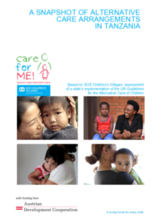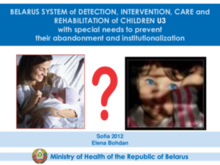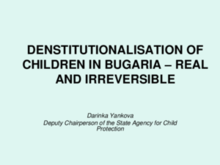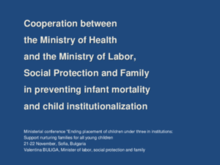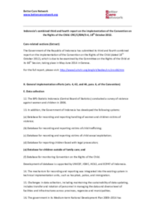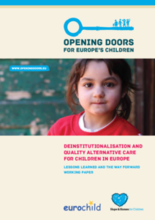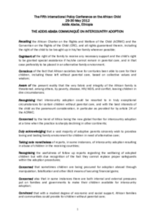Displaying 561 - 570 of 661
This report and research conducted by SOS Children’s Villages reviews alternative care arrangements in Tanzania.
In its Annual report (2011-2012), the Indian Ministry of Women and Child Development reports on progress in the implementation of the Integrated Child Protection Scheme (ICPS), a new policy and programmatic strategy that specifically articulates the need to move away in approach and services from over-reliance on institutional care and towards responses that support family based care.
This presentation to the 2012 Sofia Conference introduces social services available in Belarus for the identification, intervention, care, and rehabilitation of children under the age of 3 with disabilities, in order to prevent their abandonment and placement in institutions.
This presentation to the 2012 Sofia Conference by Darinka Yankova, Deputy Chairperson of the State Agency for Child Protection addresses the challenges and the new vision for the deinstitutionalization of children in the Republic of Bulgaria.
This presentation to the 2012 Sofia Conference by Valentina Buliga, Minister of Labor in Moldova, Social Protection and Family, introduces Moldova's ongoing collaboration between the Ministry of Health and the Ministry of Labor to reduce infant mortality and the placement of children under the age of 3 in institutions.
This research paper provides a brief overview of the Vietnam Babylift and of a more recent child abduction attempt in Chad. Then, turning to the history of child abduction and adoption history in Latin America, the paper presents the conflicts of El Salvador and Argentina and discusses ‘living disappeared’ children – those who disappear into adoption networks during war. The research explores the post-conflict social realities in both nations. The role of the social worker and specific practices are identified and discussed in context of generalist social work practice.
In this TED Talk, poet and playwright Lemn Sissay tells his story of growing up in foster care in the UK.
Care related section of the Government of the Republic of Indonesia's third and fourth combined report on the implementation of the Convention on the Rights of the Child (dated 18th October 2012).
This paper aims to raise awareness on the perverse effects of institutionalisation on children and it calls for comprehensive system reforms, starting with a transition towards family and community-based care. It highlights country level lessons learnt in the European context that demonstrate how deinstitutionalisation can be achieved in practice.
In the recently released outcome document of the Fifth International Policy Conference on the African Child, conference delegates call for a reversal of the current trend of resorting to intercountry adoption as a primary solution for African children in need of alternative care, and for giving prime priority to enabling all children in Africa to remain with their families and communities.

